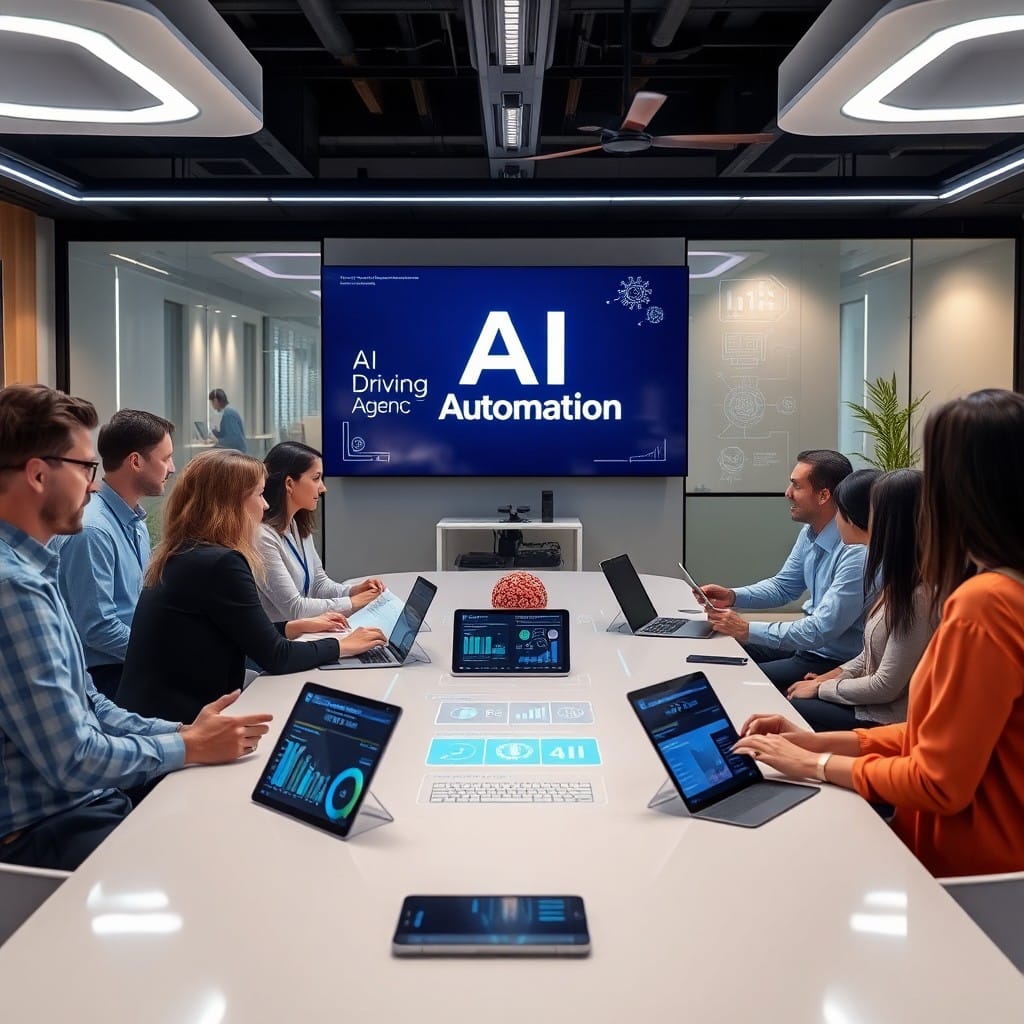AI Automation Consulting Services | AI Automation Agency

Intelligent Automation Consulting Services: Leveraging AI and Automation for Business Transformation
In today's rapidly evolving business landscape, artificial intelligence and automation have become critical drivers of competitive advantage. Organizations across industries are turning to intelligent automation consulting services to harness the power of AI, streamline workflows, and achieve significant business transformation. By partnering with an AI automation agency, companies can implement cutting-edge solutions that reduce time-consuming manual processes, optimize operations, and deliver substantial return on investment. This comprehensive guide explores how AI automation services can revolutionize your business processes and help you stay ahead in an increasingly digital marketplace.
What are AI Automation Consulting Services and How Can They Benefit My Business?
Understanding the Core Elements of AI Automation Services
AI automation consulting services represent the strategic integration of artificial intelligence and process automation technologies to transform business operations. These services combine the analytical capabilities of AI models with workflow automation tools to create intelligent systems capable of handling complex business processes. At its core, AI automation leverages machine learning algorithms, natural language processing, and other AI technologies to automate repetitive tasks that traditionally required human intervention. Professional automation consultants work with organizations to identify opportunities where custom AI solutions can be deployed to improve efficiency, accuracy, and scalability. The scope of these services typically includes everything from initial assessment and strategy development to implementation of AI-powered tools such as RPA (Robotic Process Automation), chatbots, predictive analytics platforms, and generative AI applications like ChatGPT. By understanding these fundamental elements, businesses can better appreciate how intelligent automation consulting can address their specific operational challenges.
Key Benefits of Working with an AI Automation Agency
Partnering with an AI automation agency offers numerous advantages for businesses seeking to modernize their operations. Primarily, these specialized agencies bring deep expertise in both AI technology and automation solutions, providing access to knowledge that would be difficult and expensive to develop in-house. This expertise translates into faster implementation of custom AI solutions tailored to your specific business needs. A reputable AI automation agency will help you identify the most impactful use cases where automation can deliver maximum business value, ensuring your technology investments yield significant ROI. Moreover, these agencies stay at the forefront of AI strategies and innovations, bringing fresh perspectives on how emerging technologies like generative AI can transform your business processes. They also ensure the responsible AI implementation with appropriate governance frameworks to mitigate risks associated with automated decision-making. Additionally, working with automation experts reduces the burden on your internal IT resources while accelerating digital transformation initiatives. Through comprehensive consulting services, these agencies facilitate seamless onboarding of new AI tools and provide ongoing support to optimize performance as your business evolves. The combination of technical knowledge and strategic guidance allows businesses to fully capitalize on the transformative power of AI and automation.
How Automation Consultants Drive Operational Excellence
Automation consultants play a pivotal role in driving operational excellence across organizations through strategic implementation of AI and automation technologies. These specialists begin by conducting thorough assessments of existing workflows, identifying inefficiencies and bottlenecks that impede productivity. By mapping current business processes against potential automation opportunities, consultants can prioritize initiatives that will deliver the most significant improvements. The expertise of automation consultants extends beyond merely implementing technology; they fundamentally reimagine how work gets done. For instance, they might recommend deploying RPA to handle data entry and validation tasks, freeing employees to focus on higher-value activities that require human judgment. Similarly, they might suggest implementing AI-powered analytics to extract actionable insights from vast amounts of unstructured data, enabling more informed decision-making. Automation consultants also excel at integrating disparate systems through API connections and middleware solutions, creating cohesive workflows that eliminate manual handoffs between departments. Throughout the transformation journey, these professionals establish key performance indicators to measure progress, regularly assessing cost savings, error reduction rates, and productivity improvements. By continuously refining automation solutions based on performance data, automation consultants ensure that organizations achieve sustainable operational excellence that adapts to changing business requirements and emerging technologies.
How to Choose the Right Automation Consulting Services for Your Specific Needs?
Essential Qualities to Look for in Automation Consultants
When selecting automation consultants to guide your organization's digital transformation journey, certain essential qualities distinguish exceptional providers from mediocre ones. First and foremost, look for consultants with demonstrable expertise in both AI technology and business process optimization. The most effective consultants possess a hybrid skill set that bridges technical knowledge with strategic business thinking. They should demonstrate proficiency across various automation tools and platforms, including RPA solutions, machine learning frameworks, and AI-powered analytics systems. Beyond technical capabilities, superior automation consultants exhibit strong analytical thinking and problem-solving abilities, enabling them to identify non-obvious automation opportunities that deliver substantial business value. Communication skills are equally crucial; consultants must translate complex technical concepts into business terms that stakeholders at all levels can understand and support. Experience within your specific industry sector is another vital consideration, as consultants familiar with your industry's regulatory environment and typical workflows can accelerate implementation timelines. Look for evidence of the consultant's commitment to responsible AI practices, ensuring ethical considerations are incorporated into automation strategies. Additionally, the best consultants maintain a vendor-agnostic approach, recommending technologies based on your specific needs rather than partnerships or commissions. Finally, assess their project management methodology and change management expertise, as successful automation initiatives require not just technical implementation but organizational adaptation to new ways of working.
Evaluating AI Automation Service Providers: A Checklist
To systematically evaluate potential AI automation service providers, organizations should utilize a comprehensive checklist that covers all critical aspects of the partnership. Begin by examining the provider's portfolio of completed projects, particularly those resembling your intended use cases or within your industry. Request detailed case studies that quantify the business impact achieved through their AI automation services, including specific metrics around cost savings, productivity improvements, and ROI. Assess their technical capabilities by inquiring about their expertise with relevant technologies such as machine learning algorithms, natural language processing, computer vision, and integration platforms like Make.com. Investigate their approach to custom AI solutions development versus implementing pre-built AI products or tools. A strong provider should offer flexibility in their methodology, adapting to your organization's unique requirements rather than forcing a one-size-fits-all solution. Evaluate their team composition, ensuring they have the right mix of data scientists, automation engineers, business analysts, and project managers. Review their implementation timeline and methodology, looking for a structured approach that includes discovery, design, development, testing, deployment, and ongoing optimization phases. Consider their change management capabilities, as successful automation initiatives require employee buy-in and adaptation. Inquire about their pricing structure and contract terms, watching for transparency and alignment with value delivery. Finally, request references from current clients who can speak to the provider's reliability, communication style, and ability to deliver on promises. This systematic evaluation will help identify an AI automation agency that aligns with your specific business objectives and organizational culture.
Red Flags to Avoid When Selecting an AI Automation Agency
When navigating the selection process for an AI automation agency, being alert to certain red flags can help you avoid partnerships that might lead to disappointing outcomes or wasted investments. One significant warning sign is an agency that makes grandiose promises about the capabilities of AI and automation without qualifying these claims with realistic timelines and implementation challenges. Be wary of providers who cannot clearly articulate their methodology for developing custom AI solutions or who seem to push a standardized approach regardless of your specific business context. Agencies that lack transparency about their technical capabilities or are unable to provide detailed explanations of how they would address your particular use cases should raise concerns. Another red flag is an overemphasis on implementing cutting-edge AI technology without sufficient focus on business value and ROI calculations. Reputable automation consultants should prioritize business outcomes over technological sophistication. Be cautious of firms that cannot provide references from previous clients with similar automation needs or who are reluctant to share case studies demonstrating measurable results. Agencies that downplay the importance of change management and employee onboarding in the automation process may be underestimating a critical success factor. Additionally, watch for consultants who seem unfamiliar with regulatory considerations and responsible AI practices relevant to your industry. Pricing structures that lack clarity or seem misaligned with deliverables warrant careful scrutiny. Finally, be skeptical of providers who promise complete automation of complex processes without human oversight, as even the most advanced AI solutions typically require some level of human judgment for exceptional cases. By recognizing these warning signs early, you can avoid partnering with agencies ill-equipped to deliver successful AI automation initiatives.
What Types of AI and Automation Solutions Can Enhance Your Workflow Efficiency?
Implementing Chatbots and Conversational AI for Customer Engagement
Chatbots and conversational AI represent one of the most transformative applications of AI automation for enhancing customer engagement while simultaneously streamlining operational workflows. These intelligent systems leverage natural language processing and machine learning algorithms to understand and respond to customer inquiries across multiple channels, including websites, messaging apps, and social media platforms. Modern AI-powered chatbots go far beyond simple rule-based responses, employing sophisticated AI models that can interpret context, recognize intent, and maintain conversation history to provide personalized assistance. Organizations implementing these solutions can automate routine customer interactions such as account inquiries, product information requests, appointment scheduling, and basic troubleshooting, allowing human agents to focus on more complex issues requiring empathy and judgment. The integration of chatbots with backend systems enables them to retrieve customer data, process transactions, and update records in real-time, creating seamless experiences that eliminate the friction of traditional service channels. Advanced implementations utilizing generative AI technologies like ChatGPT can produce remarkably human-like conversations while continuously improving through machine learning. Beyond customer-facing applications, conversational AI can also enhance internal workflows by creating virtual assistants that help employees navigate company resources, submit requests, or retrieve information from knowledge bases. When properly implemented with the guidance of automation consultants, these systems can deliver significant cost savings while improving customer satisfaction metrics. The key to success lies in designing conversational flows that balance automation efficiency with appropriate human handoffs for complex scenarios, ensuring that technology enhances rather than frustrates the customer experience.
Process Automation Tools for Eliminating Repetitive Tasks
Process automation tools represent the cornerstone of intelligent automation initiatives, targeting the elimination of repetitive, time-consuming tasks that drain organizational productivity and employee engagement. At the forefront of these solutions is Robotic Process Automation (RPA), which enables businesses to create digital workers or "bots" that mimic human interactions with digital systems to execute rule-based processes. These bots can navigate between multiple applications, extract data from documents, populate forms, reconcile records, and perform calculations with greater speed and accuracy than human workers. When enhanced with AI capabilities such as machine learning and computer vision, these tools can handle increasingly complex workflows involving unstructured data and decision points. Workflow automation platforms like Make.com provide visual interfaces for designing end-to-end process flows that integrate disparate systems without requiring extensive coding knowledge. Document processing automation, powered by optical character recognition and natural language processing, can extract, classify, and route information from various document formats, dramatically reducing manual handling. Automation consultants typically recommend implementing these tools for high-volume, standardized processes such as invoice processing, data entry, report generation, employee onboarding, and compliance verification. The integration of these automation solutions with existing enterprise systems creates digital workflows that minimize human intervention while maintaining appropriate controls and exceptions handling. Organizations that successfully deploy process automation often report dramatic reductions in processing times, error rates, and operational costs, while simultaneously improving compliance and auditability. As these tools mature, they increasingly incorporate AI-powered predictive capabilities that can anticipate process exceptions and recommend optimizations, creating a virtuous cycle of continuous improvement in operational efficiency.
AI-Powered Analytics and Decision Support Systems
AI-powered analytics and decision support systems represent a sophisticated application of artificial intelligence that transforms how organizations derive insights and make strategic decisions. These advanced solutions leverage machine learning algorithms to analyze vast quantities of structured and unstructured data, identifying patterns and correlations that would remain invisible to traditional analytics approaches. Predictive analytics capabilities enable businesses to forecast trends, anticipate customer behaviors, and proactively address potential issues before they impact operations. By implementing these AI solutions, organizations can automate the analysis of complex datasets, eliminating the time-consuming manual interpretation that often delays critical business decisions. For instance, AI-powered analytics can continuously monitor operational metrics to identify inefficiencies in workflows, automatically flagging anomalies and recommending process improvements. In customer-facing applications, these systems can analyze interaction data to identify sentiment patterns and predict churn risk, enabling targeted retention strategies. The real transformative power emerges when these analytical capabilities are integrated into decision support systems that provide contextualized recommendations to business users. These systems can evaluate multiple scenarios based on historical data and current conditions, presenting decision-makers with optimized options and their likely outcomes. Financial institutions use such systems for risk assessment and fraud detection, while manufacturers deploy them for supply chain optimization and predictive maintenance. Automation consultants specializing in analytics implementations focus on creating interpretable AI models that not only provide accurate predictions but also explain the reasoning behind recommendations, building trust in the technology. As these systems mature, they increasingly incorporate reinforcement learning techniques that allow them to improve their recommendations based on feedback about decision outcomes, creating ever more sophisticated decision support capabilities that maximize business value while respecting responsible AI principles.
What are the Most Impactful Use Cases for AI Automation in Different Industries?
Financial Services: Automating Compliance and Risk Management
The financial services industry has emerged as one of the most fertile grounds for AI automation, particularly in the critical domains of compliance and risk management. Financial institutions face unprecedented regulatory scrutiny, with compliance requirements consuming substantial resources and creating significant operational overhead. Intelligent automation consulting has revolutionized this landscape by implementing AI-powered solutions that can continuously monitor transactions, customer interactions, and market activities for regulatory violations or suspicious patterns. Machine learning algorithms can analyze vast datasets to identify potential money laundering schemes, fraudulent activities, or insider trading with greater accuracy than manual reviews. Automation tools can extract relevant information from regulatory announcements and automatically update compliance protocols, ensuring institutions remain current with evolving requirements. In risk management, AI models leverage predictive analytics to assess credit worthiness, market volatility, and operational risks with unprecedented precision. These systems can analyze traditional financial metrics alongside alternative data sources such as social media sentiment, news events, and macroeconomic indicators to provide comprehensive risk assessments. RPA solutions automate the collection and consolidation of risk data from disparate systems, eliminating error-prone manual processes and providing risk officers with real-time dashboards. Chatbots equipped with natural language processing capabilities help employees navigate complex compliance procedures and provide guidance on proper protocols. The implementation of these automation solutions has delivered substantial business value through reduced compliance costs, minimized regulatory penalties, improved risk assessment accuracy, and accelerated decision-making. Financial institutions that partner with specialized automation consultants can develop custom AI solutions tailored to their specific regulatory environment and risk profile, creating competitive advantages through more efficient compliance operations and more effective risk management frameworks.
Healthcare: Optimizing Patient Care Through AI Automation
The healthcare industry is witnessing a profound transformation through the strategic implementation of AI and automation technologies that optimize patient care while addressing operational challenges. Intelligent automation consulting services are helping healthcare providers deploy AI-powered solutions across the entire care continuum. In administrative workflows, RPA tools automate insurance verification, prior authorization requests, and claims processing, reducing the bureaucratic burden on clinical staff and accelerating reimbursement cycles. Conversational AI applications in the form of virtual health assistants help patients schedule appointments, receive medication reminders, and access basic health information, improving engagement while reducing call center volumes. On the clinical side, AI-powered analytics tools process vast amounts of patient data to identify high-risk individuals who might benefit from preventive interventions, enabling more proactive care management. Machine learning algorithms assist with diagnostic processes by analyzing medical images, laboratory results, and electronic health records to flag potential issues for physician review. In hospital settings, workflow automation optimizes resource allocation, from operating room scheduling to staff assignments, ensuring maximum efficiency while maintaining quality standards. Predictive analytics models forecast patient admission rates and length-of-stay metrics, helping administrators make informed staffing and capacity decisions. The responsible implementation of these AI technologies requires careful attention to patient privacy, data security, and clinical validation, making specialized healthcare automation consultants particularly valuable. These experts understand both the technological possibilities and the regulatory constraints unique to healthcare environments. Organizations that successfully leverage AI automation in healthcare report significant improvements in operational metrics such as reduced wait times and administrative costs, alongside clinical outcomes including decreased readmission rates and improved chronic disease management. As these technologies mature, they increasingly support personalized medicine approaches that tailor treatments to individual patient characteristics, promising even greater optimization of healthcare delivery.
Manufacturing: Achieving Efficiency Gains with Intelligent Automation
The manufacturing sector has become a primary beneficiary of intelligent automation, with AI-powered solutions delivering unprecedented efficiency gains across production processes. Forward-thinking manufacturers are partnering with automation consultants to implement comprehensive digital transformation strategies that leverage the combined power of AI and automation technologies. On the factory floor, machine learning algorithms analyze data from IoT sensors to enable predictive maintenance programs that identify potential equipment failures before they occur, dramatically reducing costly unplanned downtime. Computer vision systems powered by AI models continuously monitor product quality, detecting defects with greater accuracy than human inspectors while operating at production speeds. Collaborative robots equipped with AI capabilities work alongside human operators, handling repetitive or physically demanding tasks while adapting to changing production requirements. In supply chain operations, predictive analytics forecast demand patterns with increasing precision, allowing manufacturers to optimize inventory levels and production schedules. Digital twins—virtual replicas of physical manufacturing systems—simulate various scenarios to identify process improvements.
Q: How can the power of AI transform my business operations?
A: The power of AI can fundamentally transform your business operations by automating repetitive tasks, enhancing decision-making through data-driven insights, and creating new business models. Our AI automation consulting services help clients transform their current processes by identifying areas where AI can make the most impact. This typically results in reduced manual work, enhanced efficiency, and allows your team to focus on high-value activities that drive productivity and innovation. Depending on your specific business goals, we can implement solutions ranging from chatbots for customer service to comprehensive AI systems for complex operations.
Q: What qualifications do your automation engineers have?
A: Our automation engineers possess extensive expertise in both traditional automation and AI technologies. They hold advanced degrees in computer science, data science, or related fields, and have practical experience implementing machine learning models across various industries. Each of our engineers stays current with industry trends through continuous professional development and certifications from leading platforms like OpenAI. They're skilled in agile methodologies to ensure smooth project completion and are experienced in both code-based solutions and no-code approaches to AI implementation, allowing us to tailor our approach to your technical capabilities.
Q: How do you ensure seamless integration of AI systems with our existing infrastructure?
A: Seamless integration is a cornerstone of our consultancy approach. We begin with a thorough assessment of your current processes and technical infrastructure to identify potential integration points and challenges. Our automation team develops a detailed implementation roadmap that minimizes disruption while maximizing the benefits of automation and AI. We use a phased approach to integration, testing extensively at each stage, and providing comprehensive documentation and training to your team. Additionally, we build solutions with flexibility in mind, allowing your AI systems to evolve alongside your business, ensuring long-term compatibility and scalability.
Q: What types of AI projects does your agency typically handle?
A: Our agency handles a diverse range of AI projects tailored to specific business needs. Common projects include developing intelligent chatbots for customer service, creating predictive analytics systems for business intelligence, implementing content marketing automation, enhancing operational efficiency through process automation, and developing custom machine learning models for specialized business challenges. We're equally comfortable with projects requiring deep technical expertise and those focused on helping organizations use AI responsibly to augment human capabilities. Whether you need comprehensive AI transformation or targeted solutions for specific business challenges, our consultancy services are designed to deliver measurable results.
Q: How do you measure the success of AI automation initiatives?
A: We measure success through quantifiable metrics aligned with your business goals. Before implementation, we establish clear KPIs such as time saved through automation, reduction in manual work, improved accuracy rates, customer satisfaction scores, or revenue growth. Our data-driven approach includes regular reporting on these metrics, with dashboards that provide real-time visibility into performance. Beyond numbers, we also assess qualitative improvements like enhanced team morale and innovation capacity when team members can focus on high-value work. We consider an AI initiative successful only when it delivers tangible business value and supports your long-term strategic objectives.
Q: How can small businesses leverage the power of AI without massive investments?
A: Small businesses can effectively harness the power of AI through strategic, targeted implementations that maximize ROI. We offer scalable solutions including no-code AI tools that require minimal technical expertise, subscription-based AI services with predictable costs, and phased implementation approaches that allow you to start small and expand. Many of our small business clients begin by automating their most time-consuming processes or implementing AI to enhance customer experiences through intelligent chatbots. We also help identify opportunities to use AI to create competitive advantages specific to your market niche. Our goal is to make AI accessible regardless of your organization's size, providing the guidance needed to use AI responsibly and effectively within your budget constraints.
Q: What is your approach to helping clients use AI responsibly?
A: Using AI responsibly is central to our consultancy philosophy. Our approach includes comprehensive ethical assessments of all AI implementations, with particular attention to data privacy, bias prevention, and transparency. We help clients develop governance frameworks for their AI systems that establish clear accountability and oversight mechanisms. Our team stays current with regulatory developments and ensures all solutions comply with relevant legislation. We also emphasize the importance of human oversight in AI decision-making, particularly in sensitive areas. Additionally, we provide training to help your team understand how to maintain ethical standards when working with AI tools. This responsible approach not only mitigates risks but also builds trust with your customers and stakeholders.
Q: How do you ensure our automation team understands and can maintain the AI solutions you implement?
A: Knowledge transfer is a critical component of our engagement model. We ensure your automation team can confidently maintain and evolve your AI solutions through comprehensive documentation of all systems, hands-on training sessions tailored to different technical levels within your organization, and a collaborative implementation approach where your team works alongside ours throughout the project. We also offer extended support periods and gradual handover processes to ensure your team is fully prepared before assuming complete ownership. Additionally, we can establish mentorship relationships between our automation engineers and your team members to facilitate deeper learning. Our goal is not just to implement technology but to build your organization's capacity to innovate with AI independently.



